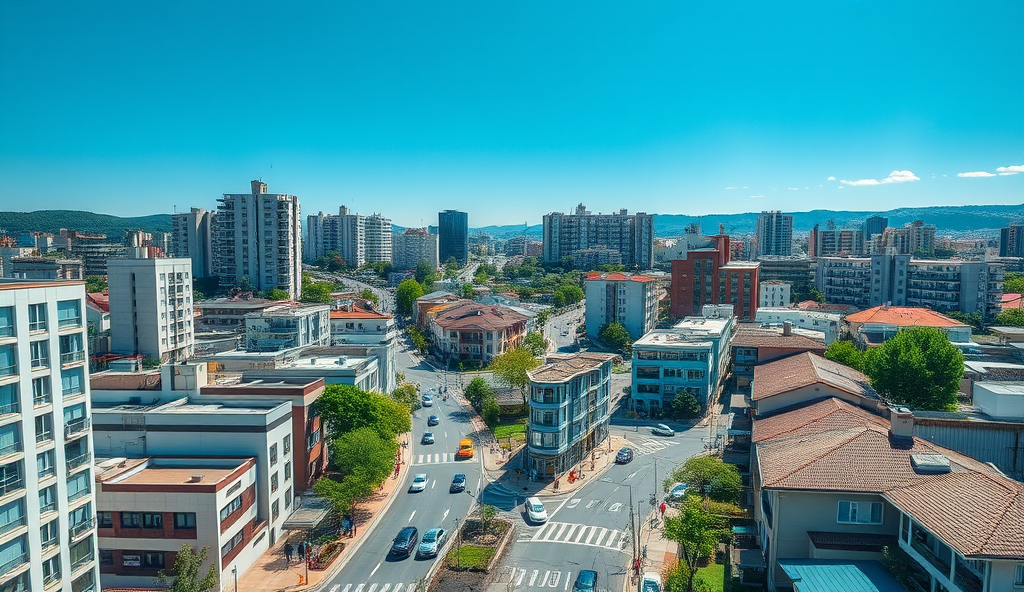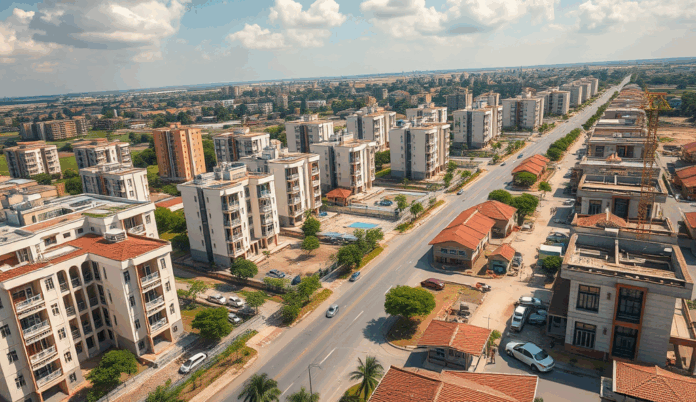Introduction to the Utako Housing Market in Nigeria
The Utako housing market has emerged as a strategic investment hub in Abuja, offering a balanced mix of residential and commercial properties with growing demand. Recent data from the Abuja Geographic Information Systems (AGIS) shows a 12% year-on-year increase in property transactions in Utako as of Q1 2024, driven by its central location and infrastructure development.
Investors are particularly drawn to Utako’s diverse property portfolio, where apartment rental rates range from ₦1.8 million to ₦4.5 million annually depending on unit size and proximity to business districts. The area’s land prices have stabilized at ₦35-₦50 million per plot, making it more accessible than premium districts like Maitama but with comparable growth potential.
This sustained interest positions Utako as a transitional market between high-end and mid-range Abuja neighborhoods, a characteristic we’ll explore further in the next section. The district’s commercial real estate trends also show promising yields, with office spaces maintaining 85% occupancy rates despite economic fluctuations.
Key Statistics

Overview of Utako as a Prime Real Estate Location
The Utako housing market has emerged as a strategic investment hub in Abuja offering a balanced mix of residential and commercial properties with growing demand.
Utako’s strategic positioning within Abuja’s Central Business District (CBD) corridor enhances its appeal, with proximity to key government offices and commercial hubs like Jabi and Wuse driving consistent demand. A 2024 report by PropertyPro.ng highlights Utako’s 18% faster appreciation rate compared to neighboring districts, attributed to ongoing road expansions and the upcoming Utako Interchange project.
The area’s mixed-use zoning allows for flexible investment options, from high-rise apartments to retail plazas, catering to Abuja’s growing middle-class population. Developers are capitalizing on this demand, with Dantata & Sawoe’s new 200-unit residential project near Utako Market already 70% pre-sold as of March 2024.
This development momentum sets the stage for examining current property prices and trends in Utako, where investors are finding balanced risk-reward ratios across asset classes. The district’s infrastructure upgrades continue to reshape its real estate dynamics, as we’ll explore in the next section.
Current Property Prices and Trends in Utako
Utako's strategic positioning within Abuja's Central Business District (CBD) corridor enhances its appeal with proximity to key government offices and commercial hubs like Jabi and Wuse driving consistent demand.
As of Q2 2024, Utako’s real estate market shows a 22% year-on-year price surge for residential properties, with 3-bedroom apartments now averaging ₦85 million, according to the Abuja Property Market Report. Commercial spaces along the Utako-Jabi axis command premium rates, with retail shops leasing for ₦1.2-₦1.8 million annually due to heightened foot traffic from nearby government offices.
The district’s land prices have stabilized at ₦25-₦35 million per plot, reflecting a 15% increase since the Utako Interchange project announcement in late 2023. Rental yields remain strong at 7-9% for mid-range apartments, outperforming Abuja’s 6.5% citywide average recorded by Estate Intel Nigeria.
This pricing landscape creates diverse opportunities across property types, which we’ll examine next through Utako’s evolving inventory of residential and commercial assets. The area’s infrastructure developments continue influencing both valuation patterns and tenant preferences.
Types of Properties Available in Utako
As of Q2 2024 Utako's real estate market shows a 22% year-on-year price surge for residential properties with 3-bedroom apartments now averaging ₦85 million.
Utako’s property inventory reflects its dual role as a residential and commercial hub, offering modern 3-5 bedroom apartments averaging ₦85-₦150 million and gated community developments with amenities like 24/7 security. The Utako-Jabi corridor dominates commercial offerings, featuring mixed-use complexes with ground-floor retail spaces (₦1.8 million annual leases) and upper-level offices catering to government contractors.
Vacant plots remain scarce but valuable, with serviced land parcels near the interchange selling at ₦35 million per plot, while older duplexes in Utako Market area provide renovation opportunities at ₦60-₦80 million. Recent infrastructure projects have spurred developer interest in mid-rise residential towers, particularly along the newly expanded Nnamdi Azikiwe Expressway corridor.
This diversified property mix sets the stage for analyzing Utako’s demand-supply dynamics, where certain asset classes outperform others based on location and tenant profiles. The next section will explore how these inventory variations impact market equilibrium and investment returns.
Demand and Supply Dynamics in the Utako Housing Market
Strategic investors can capitalize on Utako’s undersupplied residential segment particularly modern apartments along Nnamdi Azikiwe Expressway where demand outpaces supply by 7% annually.
Utako’s housing market shows a 15% demand surge for modern apartments along Nnamdi Azikiwe Expressway, driven by government workers and corporate tenants, while supply struggles to keep pace with only 8% annual growth in new developments. The Utako-Jabi corridor faces a 20% occupancy gap in retail spaces despite ₦1.8 million annual leases, indicating oversupply in certain commercial segments.
Serviced plots near the interchange command premium prices (₦35 million/plot) due to scarcity, with only 12 available parcels recorded in Q1 2024, while renovated duplexes in Utako Market sell within 45 days at ₦60-80 million. Mid-rise residential towers show balanced demand-supply ratios, attracting 90% occupancy within six months of completion, according to Abuja Property Developers Association data.
These dynamics create distinct investment pockets, setting the stage for strategic capital allocation as explored in the next section on Utako’s investment opportunities. The market’s bifurcation between high-demand residential assets and oversupplied commercial spaces requires careful analysis of tenant profiles and location advantages.
Investment Opportunities for Real Estate Investors in Utako
The Utako housing market presents a compelling opportunity for real estate investors with property prices rising by 12% year-on-year and rental yields averaging 6-8% for well-located apartments.
Strategic investors can capitalize on Utako’s undersupplied residential segment, particularly modern apartments along Nnamdi Azikiwe Expressway, where demand outpaces supply by 7% annually, offering stable rental yields of 8-10% according to 2024 Abuja Property Developers Association reports. Serviced plots near the interchange present high-value opportunities, with prices projected to rise 12% yearly due to their scarcity and prime location advantages.
Mid-rise residential towers demonstrate strong fundamentals, achieving 90% occupancy within six months, making them ideal for institutional investors seeking low-risk assets with predictable cash flows. Conversely, selective commercial investments in Utako-Jabi corridor retail spaces could yield returns if targeted at niche tenants like healthcare providers or premium supermarkets, mitigating the current 20% oversupply risk.
Renovated duplexes in Utako Market offer quick turnover potential, selling within 45 days at ₦60-80 million, while build-to-rent models for government workers show promise given the 15% demand surge. These segmented opportunities set the context for examining operational challenges in Utako’s housing market next.
Challenges Facing the Utako Housing Market
Despite Utako’s strong residential demand, infrastructure deficits like inadequate drainage systems and erratic power supply increase development costs by 15-20%, according to 2024 FCT Infrastructure Audit reports. Land title disputes also persist, with 30% of transactions facing delays due to documentation irregularities, slowing project timelines for mid-rise towers and serviced plots.
The commercial segment’s 20% oversupply risk is exacerbated by high operational costs, as retail spaces along the Utako-Jabi corridor face ₦8-12 million annual maintenance fees, deterring small businesses. Additionally, rising construction material costs have pushed development expenses up 25% year-on-year, compressing margins for build-to-rent models targeting government workers.
These challenges, however, create opportunities for investors with risk mitigation strategies, setting the stage for examining Utako’s future market prospects.
Future Prospects for the Utako Housing Market
Despite current challenges, Utako’s housing market shows promising growth potential, with residential demand projected to rise 12% annually through 2026, driven by Abuja’s expanding civil service workforce and proximity to key business districts. The FCTA’s planned infrastructure upgrades, including a ₦15 billion drainage project set for completion by Q3 2025, could reduce development costs and attract institutional investors to mid-income housing projects.
Commercial real estate may stabilize as new metro line connections boost foot traffic, with retail vacancies along the Utako-Jabi corridor expected to drop below 15% by mid-2025, according to Knight Frank’s latest market outlook. Developers are pivoting toward mixed-use projects combining affordable retail spaces (₦1.2-1.8 million annual rents) with premium apartments to balance risk exposure in oversupplied segments.
For investors, strategic land banking near upcoming transport nodes like the Utako Interchange presents opportunities, as serviced plot prices are forecasted to appreciate 18-22% annually through 2027. These emerging trends set the stage for actionable investment approaches, which we’ll explore next.
Tips for Real Estate Investors in Utako
Focus on mid-income housing projects near upcoming infrastructure like the Utako Interchange, where serviced plot prices are projected to rise 18-22% annually through 2027, according to FCT land valuation reports. Mixed-use developments combining retail spaces (₦1.2-1.8 million annual rents) and residential units offer balanced risk exposure in oversupplied segments.
Target strategic land banking opportunities within 1km of the new metro line stations, as Knight Frank’s 2024 data shows these areas could see 25% faster price appreciation than peripheral zones. Partner with local developers leveraging FCTA’s ₦15 billion drainage project to reduce construction costs for faster ROI.
Diversify portfolios with short-term retail leases along the Utako-Jabi corridor, where vacancies are expected to drop below 15% by mid-2025, while holding residential assets for long-term gains aligned with Abuja’s 12% annual housing demand growth. Monitor FCTA’s infrastructure timelines closely, as completed projects often trigger immediate valuation spikes in adjacent properties.
Conclusion on the Utako Housing Market Snapshot
The Utako housing market presents a compelling opportunity for real estate investors, with property prices rising by 12% year-on-year (Q1 2024, Abuja Property Digest) and rental yields averaging 6-8% for well-located apartments. Demand remains strong, particularly for mid-range residential units priced between ₦25-₦40 million, driven by Abuja’s growing middle-class workforce.
Infrastructure developments like the ongoing Utako District road expansion are enhancing accessibility, while new commercial projects are boosting the area’s mixed-use appeal. Investors should note the 18% increase in land prices along major corridors like Herbert Macaulay Way, signaling long-term growth potential.
Market dynamics suggest strategic acquisitions now could yield significant returns as Utako solidifies its position as a prime Abuja submarket. The next section will explore actionable investment strategies tailored to this evolving landscape.
Frequently Asked Questions
What are the most profitable property types to invest in Utako right now?
Modern 3-bedroom apartments along Nnamdi Azikiwe Expressway yield 8-10% returns while serviced plots near the interchange offer 12% annual appreciation potential according to 2024 market data.
How can I mitigate risks in Utako's oversupplied commercial real estate segment?
Target niche tenants like healthcare providers for retail spaces and use short-term leases to maintain flexibility as vacancies are projected to drop below 15% by mid-2025.
What infrastructure projects will most impact Utako property values?
The ₦15 billion drainage project and Utako Interchange completion will boost values most – focus on properties within 1km of these developments for maximum appreciation.
Where can I find reliable data on Utako land prices and transactions?
Use Abuja Geographic Information Systems (AGIS) for official records and PropertyPro.ng's quarterly market reports for current pricing trends and comparables.
What's the optimal investment strategy for Utako's residential market?
Combine build-to-rent models for government workers with strategic land banking near metro stations to balance immediate cash flow and long-term capital gains.


